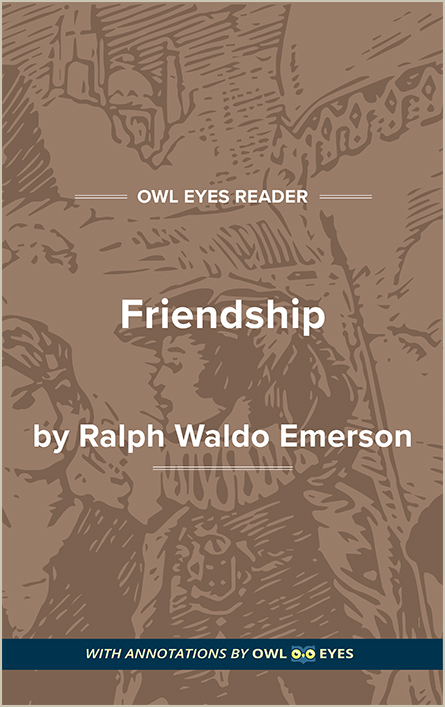Analysis Pages
Allusion in Friendship
Biblical, Mythical, and Literary Allusions: Emerson infuses his essays with allusions to Greek and Roman mythology, the biblical book of Genesis, and various authors like Milton, Plutarch, Shakespeare, and Montaigne. These allusions, paired with the nature-based metaphors and similes, elucidate many of the themes Emerson touches on, including the virtue of friendship—highlighted in references to Greek and Roman mythology—and the paradoxical nature of friendship—made clear in references to Milton and Shakespeare.
Allusion Examples in Friendship:
"Friendship"
🔒"Janus-faced..." See in text ("Friendship")
"Janus-faced..." See in text ("Friendship")
"first-born of the world..." See in text ("Friendship")
"Crimen quos inquinat, aequat...." See in text ("Friendship")
"pottage..." See in text ("Friendship")
""I offer myself faintly and bluntly to those whose I effectually am, and tender myself least to him to whom I am the most devoted."..." See in text ("Friendship")
"naturlangsamkeit..." See in text ("Friendship")
""The valiant warrior famoused for fight, After a hundred victories, once foiled, Is from the book of honor razed quite, And all the rest forgot for which he toiled."..." See in text ("Friendship")
"Egyptian skull at our banquet..." See in text ("Friendship")
"Shall we fear to cool our love by mining for the metaphysical foundation of this Elysian temple?..." See in text ("Friendship")
""crush the sweet poison of misused wine"..." See in text ("Friendship")
"Apollo and the Muses..." See in text ("Friendship")
"eye-beams..." See in text ("Friendship")

